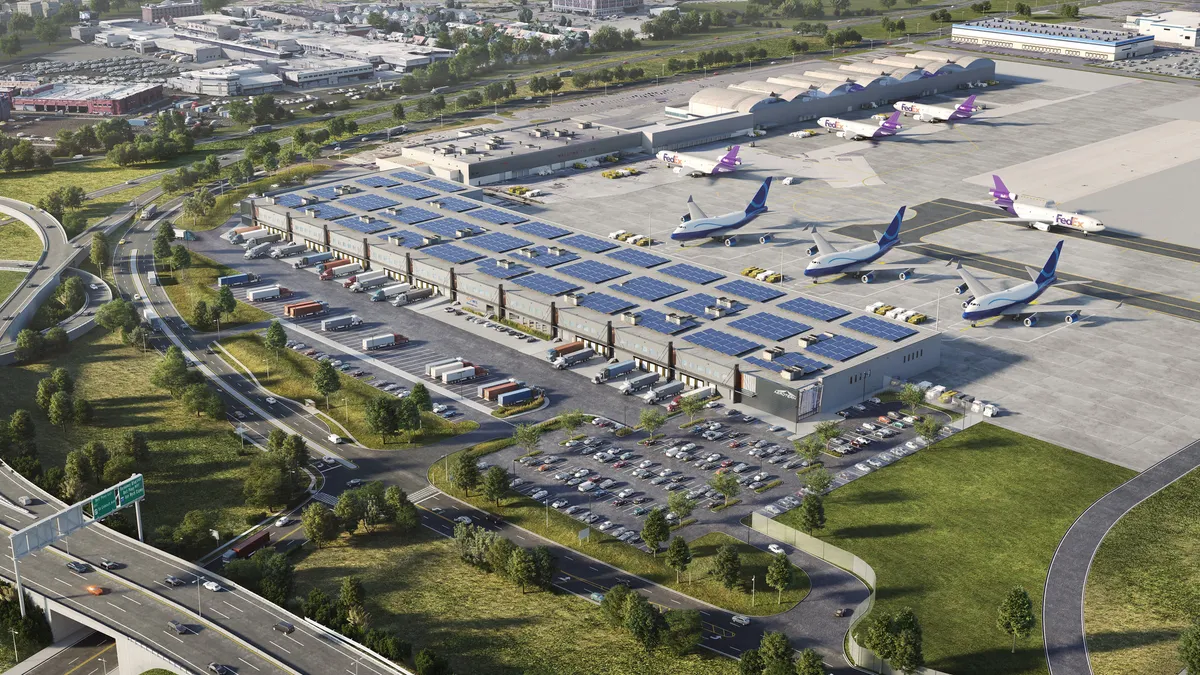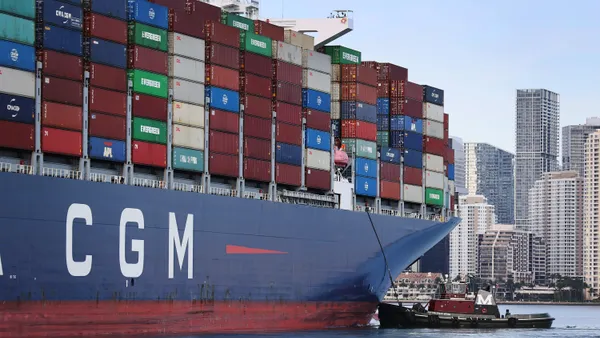Dive Brief:
- The Port Authority of New York and New Jersey signed a deal with Aeroterm last week to demolish two existing air cargo facilities at John F. Kennedy International Airport and replace them with an "expanded, best-in-class cargo facility" by the end of 2023, according to a press release.
- The $145 million project to develop a 350,000 square-foot facility will be the first new cargo facility "at JFK in two decades," according to the press release, and include "advanced technology systems" and a "dedicated temperature-controlled area for handling pharmaceutical projects."
- The project will begin in September 2021 with the demolition of two vacant buildings (buildings 260 and 261) in JFK's Cargo Area D, and is part of an ongoing airport modernization project to make JFK a "world-class airport." Once complete, Worldwide Flight Services will operate the facility exclusively.
Dive Insight:
The demolition of buildings 260 and 261 at JFK means the long awaited cargo modernization project will, quite literally, start with a bang.
New York Gov. Andrew Cuomo first announced the state's intentions to replace buildings 260 and 261 with a more modern facility in 2017, calling the project the "first phase of modernization of air cargo operations at JFK." With last week's news, the plan moved past the stakeholder approvals needed to break ground.
New York officials released a report in January 2017, calling for a plan to draw new investment to JFK's terminals, roadways, cargo facilities, access to transportation and operations. New airport development is essential as nearly two-thirds of the existing air cargo facilities do not meet industry standards, according to the report.
"Despite its built-in geographic advantages and its high volume of cargo business, JFK’s cargo operation has been unable to achieve its full potential," the report reads. "The Airport has an inefficient cargo operation that has steadily lost volume and has seen its leadership position in the market erode over the last ten years."
JFK processed 3.2 billion pounds of cargo (1.6 million tons) in 2016, the year before the report was written, ranking as the 10th most volume processed by a U.S. airport that year, according to Federal Aviation Administration data. In 2020, the FAA ranked the airport in the 12th position after it handled 3.4 billion pounds of cargo (1.7 million tons), according to preliminary FAA data released this year.
Greg Russell, vice president for development at Aeroterm, said the project to create a new 350,000 square-foot facility should help create handling capacity, as the two buildings the facility will replace have been vacant for years.
"They were designed and built at a time when functions were different. They don't support modern air cargo functions," Russell said.
In addition to creating space, the new facility will incorporate modern technology, such as an automated vertical racking system that can help store pallets or unit load devices before they are ready to move into aircrafts. "That allows enhanced efficiency because you're not just using the warehouse footprint, you're using the vertical space," Russell said.
The Aeroterm project is just the first phase of the broader cargo modernization project. In 2019, the Governor of New York announced the second phase would involve developing another 16 acres of land in the North Cargo Area of JFK to add another new handling facility, and a new "truck turn-around that would allow additional traffic to enter and exit the North Cargo Area more easily.
The second-phase project is expected to require $70 million of investment, including $13 million from the Port Authority of New York and New Jersey, and "yield an estimated 200,000 tons of additional cargo," according to the press release.
But like the Aeroterm project, it could take years before developers break ground.














